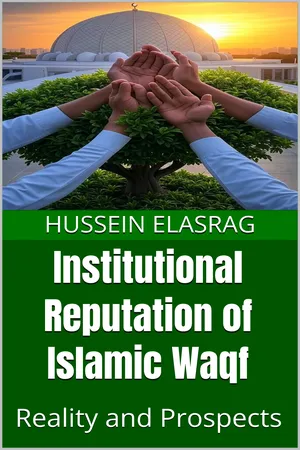
- English
- ePUB (mobile friendly)
- Available on iOS & Android
About this book
This book aims to explore the concept and strategies of managing the institutional reputation of Islamic endowments (Waqf). In certain historical periods, Islamic endowments faced systematic campaigns to tarnish their image, paving the way for their seizure and misappropriation. Restoring a positive public perception and strong institutional reputation for Waqf has become crucial, especially as the Waqf system undergoes transformation. Modern trends in establishing endowments involve creating large collective endowments with high market value or treating Waqf as a commercial venture. This topic is increasingly important due to the need to monitor and evaluate this role to achieve the best possible performance for Waqf institutions. The importance of managing the institutional reputation of Islamic endowments lies in improving their performance, enhancing resource efficiency, maximizing their value, and strengthening their market competitiveness. This supports their expansion and growth, enabling them to achieve the goals of the founders and maximize benefits for beneficiaries. Applying institutional reputation standards to Waqf institutions enhances their effectiveness, efficiency, and asset protection. The researcher believes that effective reputation management positively impacts the operational, financial, and liquidity aspects of Waqf institutions, as well as the various metrics used. This creates a comprehensive framework for their performance, supporting their sustainability and growth while serving the interests of stakeholders.
Frequently asked questions
- Essential is ideal for learners and professionals who enjoy exploring a wide range of subjects. Access the Essential Library with 800,000+ trusted titles and best-sellers across business, personal growth, and the humanities. Includes unlimited reading time and Standard Read Aloud voice.
- Complete: Perfect for advanced learners and researchers needing full, unrestricted access. Unlock 1.4M+ books across hundreds of subjects, including academic and specialized titles. The Complete Plan also includes advanced features like Premium Read Aloud and Research Assistant.
Please note we cannot support devices running on iOS 13 and Android 7 or earlier. Learn more about using the app.
Information
Table of contents
- Summary
- Introduction
- Research Problem
- Research Objective
- Research Importance
- Research Hypothesis
- Research Methodology
- Chapter 1 : Global Changes and the Need to Develop Waqf Institutions
- 1- Definition and Wisdom of Waqf
- A- The wisdom behind Waqf includes:
- B- Waqf has four pillars:
- 2- Historical Factors Affecting Waqf
- 3- Global Changes and the Need for Waqf Development
- Chpter 2 : The Concept and Importance of Managing Waqf’s Institutional Reputation
- 1- Defining Institutional Reputation for Waqf
- 2- The Importance of Institutional Reputation
- 3- Managing Waqf’s Reputation
- 4- Building and Protecting Waqf’s Institutional Reputation
- Chapter 3: Axes for Improving Waqf’s Institutional Reputation)
- 1- Waqf Governance
- A. Definition of Governance: Term and Concept
- B. Challenges to Waqf Governance
- C. Solutions for Effective Waqf Governance
- 2- Waqf Citizenship
- A. Definition and Concept of Waqf Citizenship
- B. The Importance of Waqf Citizenship
- C. Components of Waqf Citizenship
- D. Practical Examples of Waqf Citizenship
- 3. Quality of Services
- A. Definition and Importance of Service Quality in Waqf
- B. Components of Service Quality in Waqf
- C. Challenges to Service Quality in Waqf Institutions
- D. Strategies to Improve Service Quality
- 4- Community Partnerships
- A. Definition and Role of Community Partnerships
- B. Types of Community Partnerships in Waqf
- C. Challenges to Community Partnerships
- D. Strategies for Effective Partnerships
- 5. Social Marketing
- A. Definition and Importance of Social Marketing for Waqf
- B. Key Elements of Social Marketing for Waqf
- C. Challenges in Social Marketing for Waqf
- D. Strategies for Effective Social Marketing
- Results and Recommendations
- Results
- Recommendations
- Chpter 4 : Strategies for Enhancing the Institutional Reputation of Islamic Waqf: Complementary Insights and Practical Applications
- Introduction
- 1- Case Studies of Successful Waqf Institutions
- A. Qatar Foundation for Education, Science, and Community Development:
- B. Al-Rajhi Waqf in Saudi Arabia:
- C. Islamic Religious Council of Singapore (MUIS):
- 2- Importance of Quantitative Data in Enhancing Reputation
- A. Size of Waqf Assets:
- B. Impact of Transparency on Donations:
- C. Beneficiary Satisfaction:
- D. Recommendations:
- 3- Comparison with Global Models
- A. Bill " Melinda Gates Foundation:
- B. UK Charitable Trusts (Charity Commission):
- C. Rockefeller Foundation:
- 4- Implementation Model for Enhancing Institutional Reputation
- A. Phase 1: Assessment and Planning (3-6 months)
- B. Phase 2: System and Technology Development (6-12 months)
- C. Phase 3: Expansion and Impact (1-2 years)
- 5- Leveraging Technology to Enhance Reputation
- A. Blockchain Technology:
- B. Artificial Intelligence:
- C. Smartphone Applications:
- 6- Addressing Cultural and Social Challenges
- A. Correcting Misconceptions:
- B. Resistance to Change:
- C. Community Engagement:
- 7- Evaluation Framework for Institutional Reputation
- A. Key Performance Indicators (KPIs):
- B. Measurement Tools:
- C. . Periodic Evaluation:
- Conclusion
- Footnotes